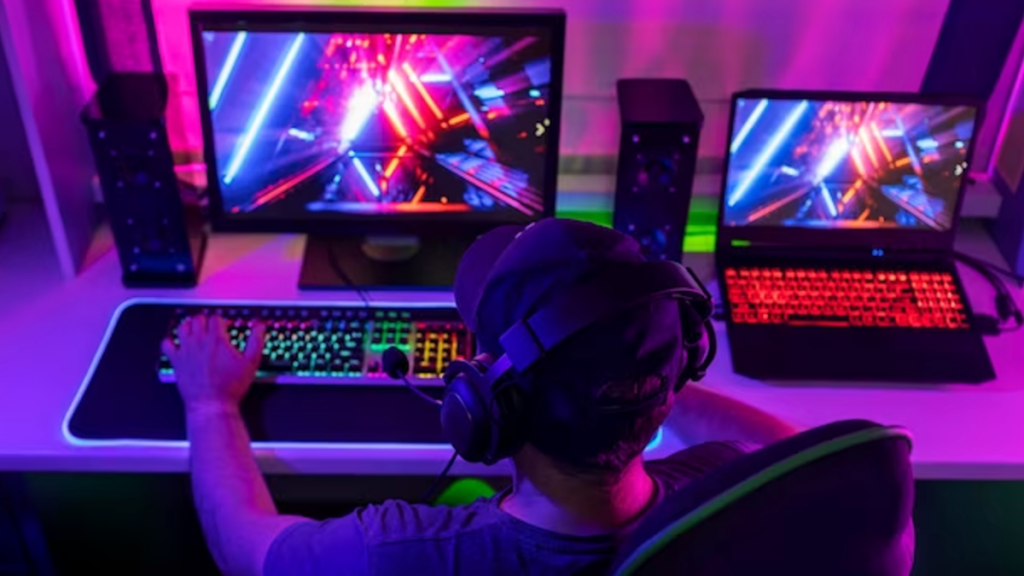The intersection of cryptocurrency and gaming has birthed a revolutionary era where virtual worlds are no longer just about entertainment, but also about economic opportunities. Cryptocurrencies, with their decentralized and secure nature, have found a natural home in the gaming industry, enabling players to own, trade, and even earn real-world value within the virtual realms. This article delves into the symbiotic relationship between cryptocurrency and gaming, exploring the various ways in which tokens are triumphing in this dynamic landscape.
Contents
Blockchain Gaming: The Marriage of Two Innovations
In recent years, blockchain technology has gained significant traction in the gaming industry, offering a transparent and secure environment for transactions. Blockchain’s decentralized ledger system ensures that in-game assets and currencies are not controlled by a single entity, fostering trust among players. Blockchain gaming relies on non-fungible tokens (NFTs), unique digital assets that can represent anything from in-game items to characters.
- Ownership and Scarcity: NFTs in slot gaming provide players with true ownership of in-game assets. Whether it’s a rare weapon, a unique character skin, or virtual real estate, players can trade these assets securely on blockchain platforms, ensuring scarcity and value retention.
- Cross-Platform Compatibility: Blockchain’s decentralized nature allows for cross-platform compatibility. Gamers can seamlessly transfer their NFTs between different games and platforms, creating a unified virtual economy.
- Play-to-Earn Models: Cryptocurrency in gaming has given rise to play-to-earn models, where players can earn real-world value by investing time and skills in a game. Blockchain-based games reward players with cryptocurrency or NFTs for achievements, fostering a new era of decentralized and player-centric economies.
Crypto and In-Game Currencies
Traditional in-game currencies are often limited in their use and lack real-world value. Cryptocurrencies, on the other hand, provide a universal and valuable medium of exchange within and outside the gaming ecosystem.
- Stablecoins for Stability: Stablecoins, which are pegged to a fiat currency, are gaining popularity in gaming. These cryptocurrencies provide stability to in-game economies, mitigating the volatility associated with traditional cryptocurrencies like Bitcoin or Ethereum.
- Decentralized Finance (DeFi) Integration: Some games are integrating decentralized finance protocols, allowing players to lend, borrow, and earn interest on their in-game assets. This further blurs the lines between the gaming and financial worlds.
- Crypto as Universal Currency: Cryptocurrencies eliminate the need for multiple in-game currencies, providing a universal medium of exchange that transcends gaming platforms. This simplifies transactions and enhances the overall gaming experience.
Gaming Platforms Embrace Cryptocurrency
Major gaming platforms and developers are recognizing the potential of cryptocurrency and integrating blockchain technology into their ecosystems.
- Enjin and Multiverse: Enjin, a blockchain-based gaming platform, has introduced the concept of a gaming multiverse. In this interconnected space, players can use their assets across multiple games, creating a cohesive and expansive gaming experience.
- Decentraland and Virtual Real Estate: Decentraland, a blockchain-based virtual world, allows users to buy, sell, and develop virtual real estate using cryptocurrency. This innovative concept opens up new avenues for creativity and investment within the gaming realm.
- NFT Marketplaces for Gaming Assets: Dedicated NFT marketplaces for gacorqq gaming assets, such as OpenSea and Rarible, have emerged. These platforms enable players to buy, sell, and trade their in-game assets seamlessly, fostering a secondary market for virtual items.
Challenges and Future Outlook
While the marriage of cryptocurrency and gaming presents exciting opportunities, it is not without challenges.
- Scalability Concerns: Scalability remains a hurdle, with blockchain networks facing limitations in handling the high transaction volumes associated with popular games. Solutions like layer 2 scaling solutions and blockchain interoperability are being explored to address these challenges.
- User Adoption: Cryptocurrency’s complexity and volatility can be daunting for some gamers. Increasing user education and providing user-friendly interfaces are crucial for widespread adoption.
- Regulatory Uncertainty: The intersection of gaming and cryptocurrency raises regulatory questions. Clarity in regulations is essential to ensure the legitimacy and security of in-game transactions.
- Environmental Concerns: The energy consumption associated with some blockchain networks, particularly proof-of-work systems, has sparked environmental concerns. Transitioning towards more eco-friendly consensus mechanisms is imperative for sustainable growth.
- Integration with Traditional Gaming: Achieving seamless integration between blockchain-based gaming and traditional gaming experiences is vital for mainstream acceptance.
Conclusion
As we navigate the dynamic landscape of cryptocurrency in gaming, it is evident that the token triumphs are reshaping the way we perceive virtual worlds. The synergy between blockchain technology and gaming not only empowers players with true ownership but also opens up new economic avenues. While challenges persist, the trajectory is clear – the future of gaming is becoming increasingly decentralized, player-centric, and economically empowering. As more developers, platforms, and players embrace the potential of cryptocurrency, the virtual realms we explore will continue to evolve, offering a glimpse into a future where gaming is not just a pastime but a vibrant and interconnected ecosystem with real-world implications.

